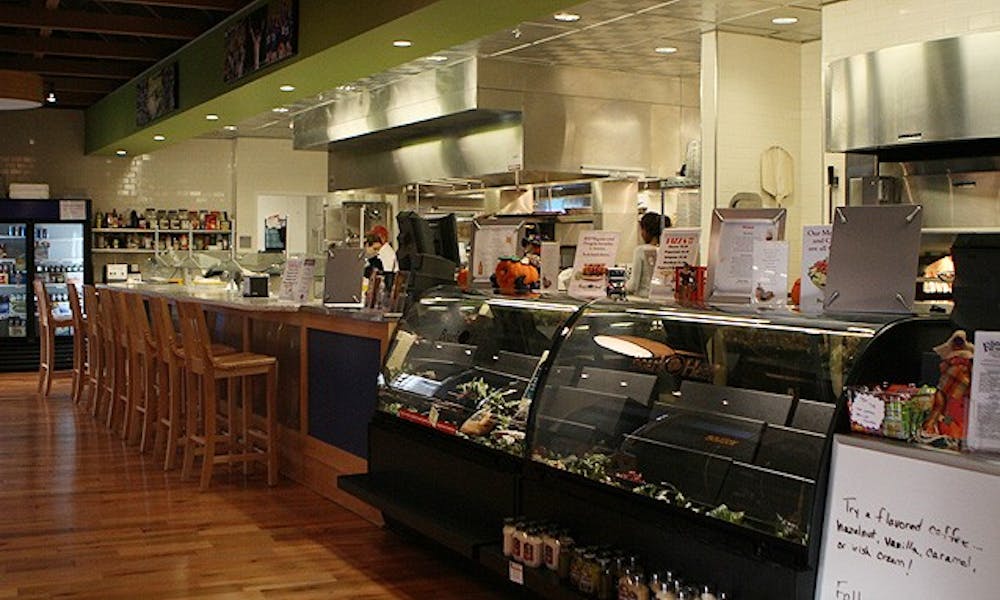Students are rallying in support of the Food Factory despite its unsuccessful start this year.
A group that includes members of Duke Student Government, Duke University Student Dining Advisory Committee and the general student body have started a movement to save the Food Factory, which has had trouble attracting business since arriving to Central Campus this year. The student-created committee aims to counter the undue negative publicity the business has recently received by reaching out to the Duke community and improving advertising, said senior Manny Olojede, a DSG senator for student life.
“The food is great, but they aren’t getting as many students as they wanted,” Olojede said. “We want to change perceptions about the Food Factory.... They are still trying.”
The restaurant’s owner Jim Schmid said he appreciates the student effort to increase traffic to the eatery. Schmid, who has been working approximately 80 hours a week to keep the restaurant afloat, added that while it may be struggling now, the outlook for its future is improving.
“We’re happy that students are trying to keep us there, and we’re trying to fill their needs with food,” he said. “I’m not going anywhere. Last month just stunk.”
DUSDAC co-Chair Beth Gordon, a junior, said she believes that many students do not eat at the Food Factory because it is located on Central Campus—not because there is anything wrong with the restaurant itself. The newly established Food Factory committee will consider ways to publicize the restaurant, Gordon added, noting that the restaurant has not done enough publicity on its own.
Schmid said he agrees that Food Factory management is partially at fault. He added that he has not implemented an official marketing strategy. At the restaurant’s previous location in Cary, N.C., the Food Factory relied mainly on word of mouth for advertisement, but this tactic has not worked at Duke.
“I don’t really know what I’m doing with advertising,” Schmid said, noting that he is just beginning to get acclimated with the University environment.
Additionally, there was no formal process for educating Food Factory management about Duke, which Schmid said would have been helpful. He said he has learned the most about his market by talking to students—but there are certain topics that students are not knowledgeable about, such as how to manage Merchants on Points deliveries.
“I need a booklet to tell me what I’m supposed to be doing,” he said. “I need to learn how Duke operates.”
Rick Johnson, assistant vice president for housing and dining, said he previously approached Schmid with various marketing plans that have been successful for other on-campus eateries—but Schmid was not interested.
“They’re trying to adjust to the student population—they’re coming along,” Johnson said. “[Universities are] a different market. You’ve got to get your name out there.”
The restaurant’s sales have improved in the past few weeks, after joining the Merchants on Points program and adding a weekend brunch, he said.
“Our message has always been the same,” Johnson said. “Students need to work to make the Food Factory successful. And when we say work, we mean simply dining there.”
Olojede said the student Food Factory committee plans to meet with the restaurant’s staff to exchange ideas about how to improve business in a student environment. He noted that students have expressed complaints about the restaurant because of its location and slow service. Some students are also unaware that the restaurant is no longer the Devil’s Bistro—the eatery that previously occupied the Central Campus location.
Still, people who visit the Food Factory on a regular basis seem to enjoy it, Gordon said. Although it is hard to ascertain what would attract students, creating a specialty dish or offering a good deal on a meal could go a long way, she added.
“The Food Factory is still in the start-up phase—they have to work some kinks out,” she said.
They will focus on attracting Central Campus residents who live near the restaurant, but they also hope to build up the Food Factory’s reputation so that people will take the time to go there, Olojede said.
He added that he believes business will improve next year when the house model goes into effect because many of the selective living groups relocating to Central Campus will be able to hold their meetings or events there.
“Even now, before the house model happens, having events there would help business,” Olojede said. “That would be a great way to get more people on board with the Food Factory.”
In addition to SLGs, Schmid said he would like to reach out to niche communities on Central, such as the intramural sports teams that practice on the fields near the restaurant.
“I would love to take care of students,” he said. “That would make my day.”
Get The Chronicle straight to your inbox
Signup for our weekly newsletter. Cancel at any time.

